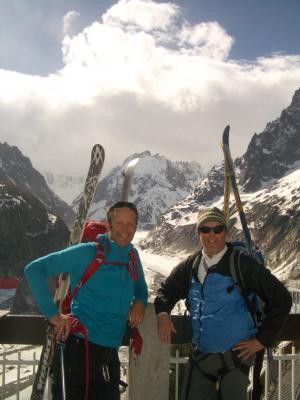
Faculty spotlight: Dr. W. Conrad Liles
From doctor to patient
It is estimated that one in 65 people in the United States will need a blood transfusion over the course of a year.
Last April, Dr. W. Conrad Liles was added to that list.

An avid skier for over 30 years and ski mountaineer for 25 years, Liles (associate chair, Department of Medicine) was about to embark on a guide-led ski mountaineering expedition on the Bernina Alps, located in the southeast corner of Switzerland, near the Italian border.
Ski mountaineering involves climbing a mountain, either on skis (using skins) or carrying them, and then skiing down.
The group planned some light ski days prior to the expedition to acclimate to the high altitude.
On the last run of the day, Liles decided to go “off-piste” – off the beaten path, or backcountry skiing – and take a different way down.
While skiing down a steep, vertical crevasse, he hit a patch of ice and fell over a 50 foot cliff, landing on rocks below.
"I literally had a life changing event," he says.
His skiing partner called for help. Switzerland has a world-class system for emergency evacuation called REGA. They arrived within minutes with a critical care flight physician and a rescue paramedic on board.
Life-threatening injuries
Liles suffered over twenty fractures – including his pelvis, sternum, spine, chest, skull and 14 ribs – and a separated shoulder. He also had significant chest trauma, major internal bleeding with blood between both lungs and the walls of the chest, and a collapsed lung. The skull fracture caused a stroke which left him partially blind in his left eye.
“I should have died," he says. "My physicians gave me less than a 30 percent chance of survival based on my standardized ‘polytrauma score’.”
After nine surgeries and a month in the intensive care unit in Switzerland, he was stable enough to return to the States, where he spent an additional three months in the hospital. He needed reconstruction of his right pelvis and shoulder, and his sternum replaced with a metal plate. He also has metal in his pelvis and chest.

Liles credits the Swiss helicopter rescue system (REGA) and surgical and critical care in both Switzerland (Kantonsspital Graubünden) and Seattle (Harborview Medical Center) for saving his life.
He also credits research.
Lifesaving research
After his initial treatments at the ICU in Switzerland, Liles developed three separate life-threatening complications: sepsis, heparin induced thrombosis (HIT) and disseminated intravascular coagulation (DIC).
Sepsis, a potentially life-threatening complication of an infection, is a major cause of tissue injury and organ dysfunction in patients hospitalized in intensive care units. HIT, a relatively rare complication associated with the medication heparin (a blood thinner), causes clotting of large blood vessels, and DIC is the formation of blood clots in the small blood vessels throughout the body.
Treatments for both HIT and DIC were not available ten years ago.
“The basic science that was used to create these drugs saved my life," he says. "I owe a lot to research and how it truly does save lives.”
The accident also changed his perspective and gave him a newfound respect for his own research.
Liles studies sepsis in his laboratory at the University of Washington. He developed severe sepsis while in the ICU in Switzerland and needed IV antibiotics for ten weeks.
He is also a board member and former chair of the Research and Advancement committee at Bloodworks Northwest. The committee works to improve patient outcomes through transfusion medicine research.
When the Swiss rescue helicopter reached him on the mountain, he needed emergent transfusion of nine units of blood to stop life-threatening bleeding. He received more blood at the hospital.
The path forward

Liles started back at the University of Washington full-time in September 2015 and intends to continue his innovative and collaborative research to help save lives.
Currently, he is investigating a way to detect systemic inflammation or organ failure in children with serious disease (like malaria or sepsis) so treatments can start sooner, preventing death.
He is also studying host responses in other disorders of major public health importance worldwide.
He has resumed hiking and skiing, and plans to return to backcountry skiing next spring.
Biography
Dr. W. Conrad Liles is a professor of medicine in the Division of Allergy and Infectious Diseases, and the associate chair for research in the Department of Medicine at the University of Washington.
He holds adjunct appointments in the Departments of Global Health, Pathology and Pharmacology, and is co-director of the UW Molecular Medicine PhD Program.
Collaborating with UW investigators in the Center for Lung Biology, the Institute for Stem Cell and Regenerative Medicine, and Bloodworks Northwest, as well as colleagues at the University of Toronto, Liles has developed a robust research practice. The group has published several manuscripts over the past year.